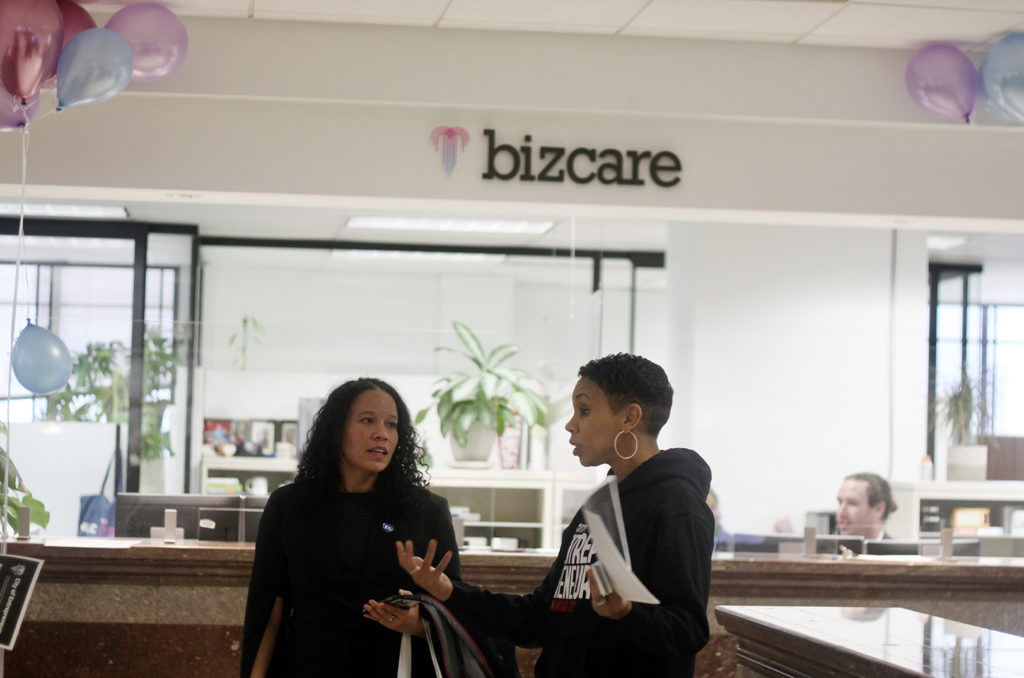Editor’s note: KC BizCare, the small business office of Kansas City, Missouri, is a partner of Startland News.
A new task force committed to giving space for Kansas City small business owners to share their voices — on issues ranging from major events like the NFL Draft to everyday concerns on permits and zoning — is expected to “create a new table” for those previously left without a seat in city discussions, said Samuel Morris.
“I wish the institutions and the systems already included small business owners, and diverse small business owners, but that’s not the case,” said Morris, small business advocate at KC BizCare. “That’s not the reality, so we’re making it the reality.”
The Kansas City, Missouri, City Council on Thursday approved an ordinance establishing a small business task force that will be charged with developing a strategic plan by October 2025 that guides the city’s support of small businesses in the Kansas City region.
The task force — which will run from July 2023 to December 2025 — aims to connect the small business community with the city government, said Morris.
“There’s never been a comprehensive body that specifically looks at all things city and all things small business and how those intersect,” Morris said, noting that previous efforts had fizzled out without producing lasting change.
Ideally, Morris said, small businesses should now have a group of individuals dedicated to hearing their voices and responding to their concerns, something that hasn’t always been the case, he added.
For instance, many small business owners and advocates expressed frustration and disappointment with what they viewed was the city’s lack of support for local businesses leading up to and during April’s NFL Draft. Morris noted the issue was one factor — though not the only one — considered in creating the task force.
“Whether businesses excelled or took a hit, the consensus among small businesses was, ‘We didn’t have a seat at the table,’” Morris said.
Acknowledging that contracting opportunities with the NFL in particular weren’t always equitable, Morris reiterated that many business owners still felt left out by the city.
“The consensus was, ‘We didn’t have a seat at the table. They didn’t ask us,’” he said. “‘We wanted to be a part of this really big, exciting, national, attention-grabbing event, but we just didn’t have a seat at the table.’”
The small business task force will not guarantee local business owners a seat at every table, Morris cautioned, nor will it provide a solution to every problem.
However, the new task force — which KC BizCare, the city’s office of small business, will oversee — will create a space for all stakeholders to be heard, he said.
“The formation of this group creates a new table,” Morris said, “so that we can ensure a small business owner, a representative from an entrepreneurial support organization, local and regional members of chambers of commerce, professional service groups, small business advocacy groups, policymakers, public administrators, regulators, etc. can all be at that table.”
Kansas City has an opportunity to set a precedent for other cities — including other cities in the metropolitan area — to follow with this task force, he added.
“Frankly, it’s a return on investment for the city that’s mutually beneficial,” Morris said. “Every city says, ‘We love small business,’ but very few have a small business strategic plan that guides how they interact with them. We’re looking to be one of those model cities that does.”
“Hopefully what works for Kansas City, Missouri, can be shared with Kansas City, Kansas, and our suburban neighbors,” Morris continued. “In a perfect world, it starts in Kansas City — it starts in the heartland — and spreads out from there.”
Strategy should outlive its planners
Beyond its outward-facing role in welcoming and including the small business community, the task force will also play critical roles within the functioning of city government, Morris said.
The task force will serve as the centralized reporting body for all current and future entrepreneurial initiatives, Morris said, in addition to connecting different city departments.
All the work leads up to the development of a small business strategic plan — set to be submitted to the City Council by October 31, 2025 — in which the task force will offer recommendations on how the city can best support area small businesses through a combination of funding, programs, technical assistance, support services, and policy changes.
“This now creates a group that can come back before the next fiscal year, or before whenever, and say, ‘Here’s exactly the plan of how we would spend city investment,’” Morris said.
Once the strategic plan is presented, the goal is for that guidance to extend long beyond the tenure of any individual, Morris said.
“We’ll be able to take a look back at that in 2025 and put together a huge strategic plan that ideally outlives our office and outlives any tenure of any particular councilperson, mayor whoever it may be,” he said. “There’s now this strategic plan that tells the city how we treat small business, and how we do it in a way that retains them, develops, and promotes them.”
Businesses on the fringe
Fifty-eight percent of startups in the Kansas City metro area shut down within five years, the second-highest rate nationally, according to a LendingTree analysis of U.S. Bureau of Labor Statistics data.
To better understand that reality of the ecosystem, the task force is expected to conduct a small business census/survey, which specifically focuses on addressing deficiencies in serving diverse entrepreneurs and businesses.
That focus on unrepresented and underrepresented individuals is critical to the task force’s mission, Morris noted, as the strategic plan should outline a long-term equitable development and funding plan for the retention and development of small businesses.
“When you include the excluded, you include everybody,” Morris said. “The reason that we’re particularly identifying these unrepresented or underrepresented groups is because if anybody has had trouble pulling a seat up to the table, it’s these businesses.”
“When we include the businesses that are underinvested, and when we include the businesses that are on the fringe, we include everybody,” he continued. “So we’re making this table particularly with that in mind.”

Corianne Rice, Center for City Solutions at the National League of Cities, speaks with Nia Richards, KC BizCare, during the November 2022 grand opening of KC BizCare’s new offices at City Hall; photo by Nikki Overfelt Chifalu, Startland News
Advocates tasked with finding solutions
The task force ordinance was introduced May 4 to coincide with the Small Business Administration’s National Small Business Week, Morris said, and was sponsored by KCMO Mayor Quinton Lucas and Councilwoman Ryana Parks-Shaw.
The group will be composed of 9-14 members called “small business advocates,” who will be appointed by the mayor in consultation with KC BizCare.
Eligible individuals include small business owners (defined as 50 or fewer employees), minority/BIPOC-led entrepreneurial support organizations, regional minority-led Chambers of Commerce, small business professional service organizations and providers, local small business advocacy groups, and regional policy makers and public administrators.
Meetings will be open to the public and held on the second Monday of every other month at 10 a.m.
Morris expressed excitement about the task’s force potential while also cautioning that its establishment represents only one step, though a much-needed one, in his estimation.
“Creating this task force is a very important step,” Morris said. “It’s not a solution; it’s a step that gets us there.”







































